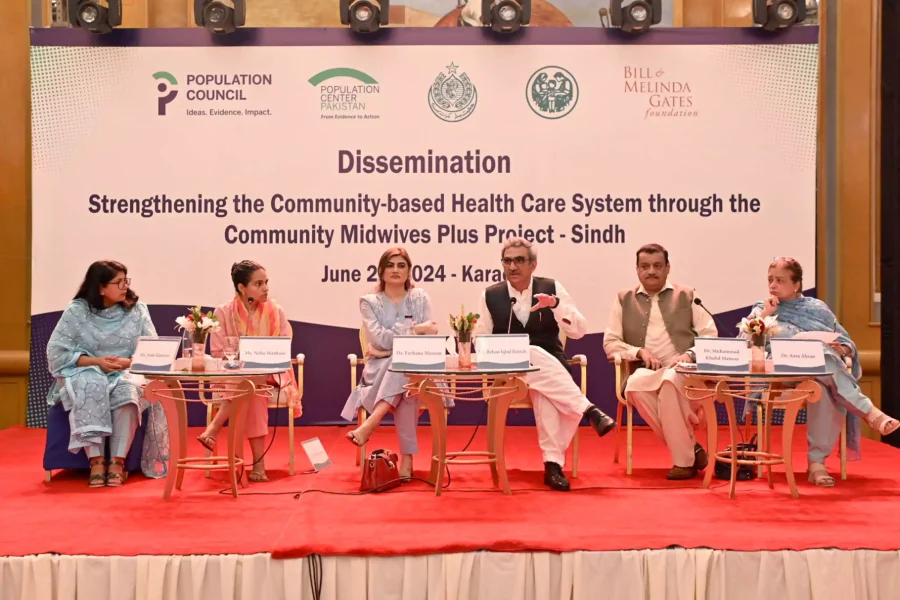Community Midwives (CMWs) are frontline first contact healthcare heroes whose services are indispensable to healthcare service delivery. Empowering CMWs has led to positive family planning results in the project districts (Matiari and Tando Muhammad Khan), highlighting the need to expand this successful approach. Building on the achievements of the CMWs Plus project, the government plans to replicate and scale it up across Sindh province”, stated Rehan Iqbal Baloch, Secretary of Health, Sindh, during the dissemination event of the project “Strengthening Community Healthcare System through Community Midwives in Sindh”.
This initiative, implemented by the Population Council in collaboration with Health and Population Welfare Departments of Sindh, aimed to enhance the role of community midwives in providing comprehensive reproductive health services, with a special focus on family planning (FP) and postpartum family planning (PPFP) services.
The community-based health system in Pakistan, particularly in rural areas, relies heavily on CMWs to deliver critical reproductive health services, including antenatal care, delivery, postnatal care, and family planning. However, recent assessments revealed that CMWs were not fully engaging with their communities, resulting in gaps in service provision. To address these challenges, the Population Council designed and piloted a model to enhance CMW engagement in rights-based FP services in the Tando Allah Yar district during 2019–2020. Building on this success, the project was expanded to Matiari and Tando Muhammad Khan during 2023–2024.
Dr. Zeba Sathar, Country Director of the Population Council, highlighted the importance of enhancing community-based healthcare services and emphasized the critical role of community midwives in improving contraceptive prevalence rates in Pakistan. She stated, “The remarkable achievements of the CMWs Plus project in Sindh offer a compelling blueprint for progress in health and family planning initiatives across Pakistan. By scaling up this successful model, we can empower communities, particularly those in rural and remote areas. This expansion has the potential to improve maternal health outcomes, reduce infant mortality rates, and ultimately empower women to reach their full potential.” She also stressed the importance of delivering healthcare services through trusted providers in rural communities to achieve Universal Health Coverage (UHC). The project involved several targeted interventions. CMWs received extensive training in FP and PPFP, including hands-on training for intrauterine contraceptive devices (IUCDs) and emergency preparedness for FP services during natural disasters.
Free contraceptives, including Sayana Press and IUCDs, were provided to CMWs through the Population Welfare Department, Sindh. Additionally, CMWs were equipped with essential medical equipment and IUCD kits to ensure high-quality service delivery.Iram Kamran, Director of Research at the Population Council, shared the project’s findings, “Through the CMWs Plus project, 97% of CMWs in Matiari and 91% in Tando Muhammad Khan have functional birth stations, compared to less than half at the project’s start. CMWs were also trained in FP and PPFP during the project, resulting in increased knowledge, skills, and income.” She also highlighted that as part of the GANC model, pioneered by the Council in Pakistan, which promotes PPFP, 650 pregnent women were served in both the districts. “The project also expanded contraceptive use, with 74% of CMWs offering five or more methods, and 66 CMWs serving over 25,000 clients from June 2023 to March 2024, leading to a significant uptake in FP methods,” she added.Dr Khalid Memon, Director General, RMNCH Sindh, while addressing the event mentioned that CMWs, once an overlooked cadre, were revitalized with the technical support of the Population Council.
“This project demonstrated that with proper training and supplies, CMWs can significantly strengthen healthcare systems in communities, especially in rural areas with limited access to medical care. The findings highlight the effectiveness of the community-based GANC model in promoting PPFP, with a remarkable 79.3% of GANC members opting for PPFP after delivery”, he added.The event culminated in a panel discussion advocating for the widespread adoption of this model across Sindh and beyond. Panelists highlighted the potential to leverage existing CMW resources for significant gains in family planning (FP) and postpartum family planning (PPFP). They envisioned an expanded CMW role, encompassing a wider range of contraceptive methods and a more comprehensive approach to reproductive health services.
Regular refresher trainings were also emphasized as crucial for maintaining and enhancing CMWs’ skills.










